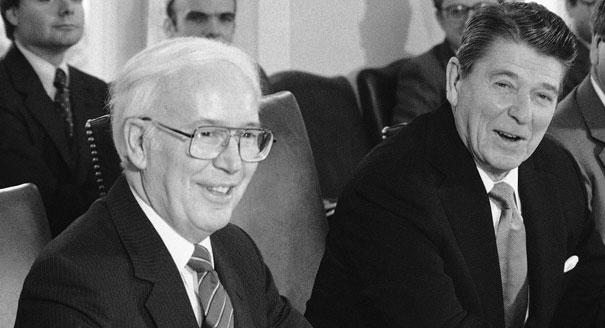Terrel Bell
Terrel Howard Bell was the United States Secretary of Education in the Ronald Reagan Administration. He also served as the U.S. Commissioner of Education under Richard M. Nixon and Gerald R. Ford. Bell was a member of The Church of Jesus Christ of Latter-day Saints.
Bell was born on November 11, 1921, in Lava Hot Springs, Idaho. He was one of nine children. His father died when he was eight years old, and his mother encouraged him to excel in school. He graduated as valedictorian from high school in 1940. While in his second year at Albion State Normal School, he enlisted in the Marine Corps when the U.S. entered World War II. He was a sergeant in the Marines and at the end of the war, continued his studies at Southern Idaho College of Education. He earned his bachelor’s degree and teaching certificate (in science and physical education) in 1946. He was a high school teacher and bus driver. He also served as a school superintendent of schools in Idaho, Wyoming, and Utah.
While superintendent of the Rockland Valley School District, he earned his master’s degree in educational administration from the University of Idaho. On a Ford Foundation graduate fellowship, he studied at Stanford University for one year. While superintendent of the Weber County School District, he worked on his doctorate degree and finished it in 1961. In 1962, he was named professor and chairman of the department of educational administration at Utah State University. In 1963, he was appointed Utah superintendent of public instruction, and he dealt successfully with employee walkouts and became a supporter of bargaining rights for both teachers and school staff.
Bell’s honed administrative skills attracted national attention, and in 1970 he was appointed an associate commissioner in the Office of Education, a division of the U.S. Department of Health, Education, and Welfare in Washington, D.C. During his tenure, the country was engaged in the struggle to end racial segregation and promote integration in the public schools. When the commissioner of education resigned several months after Bell arrived in Washington, he was named as the interim replacement. During the seven months he served as interim commissioner, he was able to tactfully negotiate cooperation with nationwide court-mandated busing for integrated classrooms, even with southern school districts where segregation remained strong.
In September 1971, Bell was named superintendent of the Granite School District in Salt Lake City, Utah. In the spring of 1974, U.S. president Richard Nixon named Bell commissioner of education, a post he held until the election of Jimmy Carter. Bell returned to Utah and served as state commissioner of education for four years. In 1981, he returned to Washington as part of Ronald Reagan’s cabinet and was charged to dismantle the Department of Education because Reagan saw it as unnecessary bureaucracy. Dismantling the department, however, required legislation. For four years he worked against opposition in the Reagan administration to make the department function, have sufficient funding, uphold integration statutes, and provide education for handicapped students.
Bell established the National Commission on Excellence in Education to evaluate the state of the nation’s school systems. “The resulting report, A Nation at Risk, issued in April 1983, was a devastating critique of American education. . . . The commission report was a wake-up call for educational reform and put forth specific means to achieve it. They included strengthening basic education in the primary grades, imposing stricter requirements for high school graduation and college admittance, and improving ‘dumbed-down’ textbooks, as well as increasing teachers’ salaries and instituting merit pay.”[1] Bell worked hard to implement the proposals of the commission.
When Reagan was reelected, Bell learned he would face harder battles with Office of Management and Budget for funding, so he resigned and returned to Utah in a professorship at the University of Utah. He also founded an educational consulting firm, T. H. Bell and Associates.
Bell published several books during his career on topics such as improving child intellectual development and reforming the educational process. His first book was a novel, The Prodigal Pedagogue. He also wrote a memoir, The Thirteenth Man.
Beginning in 2009, the Department of Education gives the Terrel Bell Award for Outstanding School Leadership to recognize “outstanding school leaders and the vital role they play in overcoming challenging circumstances.” Concurrent with the award, the Department issued a press release which stated that "[t]he late Secretary Terrel H. Bell held education as his highest priority, trusting that all students would find it their personal key to success as he had.”[2]
Bell and his wife, Betty, were the parents of four sons. He died of pulmonary fibrosis on June 22, 1996.
